
Daana Veera Soora Karna is a 1977 Indian Telugu-language Hindu mythological film co-written, produced and directed by N. T. Rama Rao under his banner Ramakrishna Cine Studios. Based on the life of Karna from the Mahabharata, the film stars Rama Rao in three roles: the title character Karna, Duryodhana, and Krishna. The music was composed by composed by Pendyala Nageswara Rao.

Mayabazar is a 1957 Indian epic Hindu mythological film directed by K. V. Reddy. It was produced by Nagi Reddi and Chakrapani under their banner, Vijaya Productions. The film was shot simultaneously in Telugu and Tamil, with a few differences in the cast. The story is an adaptation of the folk tale Sasirekha Parinayam, which is based on the characters of the epic Mahabharata. It revolves around the roles of Krishna and Ghatotkacha, as they try to reunite Arjuna's son Abhimanyu with his love, Balarama's daughter Sasirekha (Savitri). The Telugu version features Gummadi, Mukkamala, Ramana Reddy, and Relangi in supporting roles, with D. Balasubramaniam, R. Balasubramaniam, V. M. Ezhumalai, and K. A. Thangavelu playing those parts in the Tamil version.
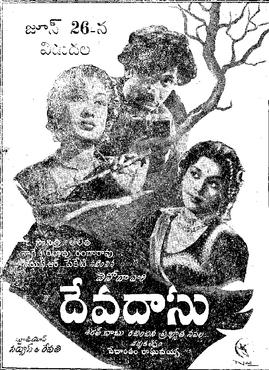
Devadasu is a 1953 Indian romantic drama film directed by Vedantam Raghavayya and produced by D. L. Narayana for Vinodha Pictures. Chakrapani wrote the script based on Sarat Chandra Chattopadhyay's novel, Devdas. C. R. Subbaraman composed the film's music. The film was edited by P. V. Narayanan, while B. S. Ranga provided the cinematography.

Bhakta Prahlada is a 1932 Indian Telugu-language Hindu mythological film directed by H. M. Reddy and produced by Ardeshir Irani of Imperial Film Company. It is the first sound film of Telugu cinema. It features Sindhoori Krishna Rao as the titular Prahlada, along with Munipalle Subbayya, Surabhi Kamalabai, Doraswamy Naidu, Chitrapu Narasimha Rao, and L. V. Prasad. No complete synopsis of the film is known to survive, but it is an adaptation of a play of the same name.

Nartanasala is a 1963 Indian Telugu-language Hindu mythological film directed by Kamalakara Kameswara Rao and written by Samudrala Sr. It stars N. T. Rama Rao, Savitri, S. V. Ranga Rao, and Relangi while Mukkamala, Mikkilineni and Dandamudi Rajagopal play supporting roles among others. Susarla Dakshinamurthi composed the film's soundtrack and background score. M. A. Rahman and S. P. S. Veerappa served as the cinematographer and editor respectively. T. V. S. Sarma was the film's art director. The film was produced by actress C. Lakshmi Rajyam and her husband C. Sridhar Rao under the Rajyam Pictures banner.

Gruhalakshmi is a 1938 Indian Telugu-language drama film produced and directed by H. M. Reddy. Starring Ramanujacharyulu, Kanchanamala, Kannamba, and Chittoor Nagayya, it was the debut production of Rohini Pictures and marked the cinematic debut of Chittoor Nagayya. The film was an adaptation of the 1929 stage play Rangoon Rowdy by Somaraju Ramanuja Rao and was a commercial success. Gruhalakshmi is notable for introducing Kanchanamala as Telugu cinema's first "oomph" girl, gaining widespread attention for its daring portrayal of sensuality. The film also marked an early career role for K. V. Reddy, who worked as a cashier for Rohini Pictures before becoming a renowned filmmaker.
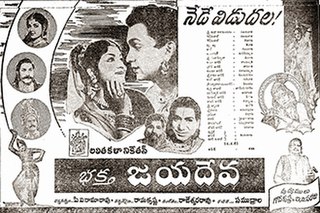
Bhakta Jayadeva is a 1961 Indian Telugu-language biographical film, based on the life of 12th Century Sanskrit Poet Jayadeva, produced by Komaravolu Narayana Rao, G. Paramdhama Reddy under the Lalitha Kala Nikethan banner and directed by P. V. Rama Rao, while Ramakrishna took care of direction supervision. It stars Akkineni Nageswara Rao, Anjali Devi and music composed by Saluri Rajeshwara Rao.
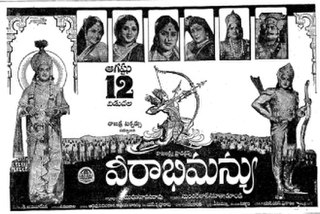
Veerabhimanyu is a 1965 Indian Telugu-language Hindu mythological film produced by Sunderlal Nahta and Doondi and directed by V. Madhusudhana Rao. It stars N. T. Rama Rao, Sobhan Babu and Kanchana, with music composed by K. V. Mahadevan. The film was recorded as a Super Hit at the box office. It was simultaneously filmed in Tamil as Veera Abhimanyu, with slightly different cast. The film had its climax scene shot in Eastmancolor. The film is considered a breakthrough for Sobhan Babu.
Surabhi Kamalabai (1913–1977) was an Indian actress who worked in Telugu theatre and Telugu cinema. She has the distinction of being the first Telugu actress in a talkie film with Bhakta Prahlada (1932), directed by H. M. Reddy. She played the role of Leelavathi, the wife of Hiranyakasipa. Since then she acted in about 30 films, including Savitri (1933), Pathala Bhairavi (1951), Malliswari (1951), Illarikam (1959) and Velugu Needalu (1961).
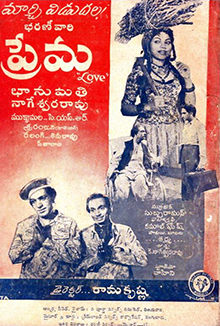
Prema (transl. Love) is a 1952 Indian romance film, produced and directed by P. S. Ramakrishna Rao under the Bharani Studios banner. The film is simultaneously made in Telugu and Tamil languages, the latter titled Kaadhal. It stars Bhanumathi Ramakrishna and Akkineni Nageswara Rao with music composed by C. R. Subburaman. Bhanumathi wrote the story, for the first time.
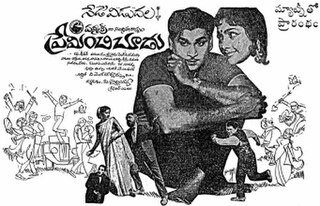
Preminchi Choodu is a 1965 Indian Telugu-language romantic comedy film directed by P. Pullayya. It stars Akkineni Nageswara Rao, Jaggayya, Rajasree and Kanchana. The film was produced by V. Venkateswarlu. Music was composed by Master Venu. It is a remake of the Tamil film Kadhalikka Neramillai (1964).

Kanchanamala (1917–1981) was an Indian actress known for her works in Telugu cinema.
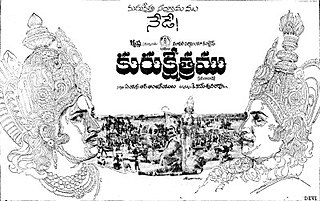
Kurukshetram is a 1977 Indian Telugu-language Hindu mythological film directed by Kamalakara Kameswara Rao. The film features an ensemble cast that includes Krishna, Sobhan Babu, Krishnam Raju, Jamuna, and Vijaya Nirmala. It was produced by A. S. R. Anjaneyulu, with Krishna serving as the presenter. The screenplay was written by Samudrala Jr., while the dialogues were penned by Tripuraneni Maharadhi. Notable supporting roles were played by Kaikala Satyanarayana, Anjali Devi, Jayaprada, Gummadi, and Chandra Mohan. The music was composed by Saluri Rajeswara Rao.
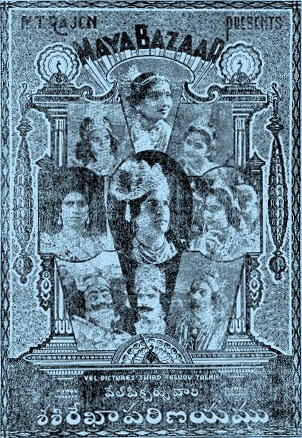
Mayabazar is a 1936 Indian Telugu-language fantasy film directed by P. V. Das and produced by Vel Pictures. The film stars Yadavalli Nageswara Rao, S. P. Lakshmana Swamy, Rami Reddy, and Santhakumari. Music was composed by Galipenchala Narasimha Rao.

Vijaya Gauri is a 1955 Indian Telugu-language swashbuckler film, produced by Krishna Pictures banner and directed by D. Yoganand. It stars N. T. Rama Rao and Padmini, with music composed by G. Ramanathan and Viswanathan–Ramamoorthy. This film was shot simultaneously in Tamil as Kaveri with slightly different cast.

Veera Abhimanyu is a 1965 Indian Tamil-language Hindu mythological film directed by V. Madhusudhana Rao and produced by Sunderlal Nahta and Doondi. Based on Abhimanyu, a character from the Indian epic Mahabharata, the film stars Gemini Ganesan leading an ensemble cast, including A. V. M. Rajan portraying the title character. It was simultaneously filmed in Telugu as Veerabhimanyu, with a largely different cast. The film was released on 20 August 1965, and failed commercially.

Sri Krishna Tulabharam is a 1935 Telugu-language Hindu mythological film directed by Mukherjee and Rajaram and produced by Calcutta Kali Film Company. The screenplay, adapted by Mutharaju Subba Rao, is based on the Tulabharam episode from the Mahabharata involving Lord Krishna and Satyabhama. The film stars Kapilavayi Ramanadha Sastry, Jayasingh, Rushyendramani, Kanchanamala, Lakshmirajyam, and Relangi. It marks the on-screen debuts of Rushyendramani, Kanchanamala, Lakshmirajyam, and Relangi, and was filmed in Calcutta.

Sakunthala is a 1932 Telugu-language film directed by Sarvottam Badami. Produced by Select Pictures, it was based on the renowned play Abhignana Sakuntalam by Kalidasa, the film features Surabhi Kamalabai in the titular role of Sakuntala and Yadavalli Suryanarayana as Dushyanta. It is among the first ten talkie films made in Telugu cinema.
Prudhvi Putra is a 1933 Indian Telugu-language Hindu mythological film written, produced and directed by Pothina Srinivasa Rao. Recognized as one of the first Telugu talkie films financed locally by Telugu people, it features Kalyanam Raghuramaiah, Parupalli Satyanarayana, and Surabhi Kamalabai in prominent roles. The film is based on the story of Narakasura, who requests Lord Krishna to invite him to celebrate his own death, which is joyfully celebrated by others.

Harischandra is a 1935 Telugu-language mythological film directed by T. A. Raman and produced by Star Combines. Featuring Addanki Srirama Murthy, Kannamba, and Master Bhima Rao in the lead roles, the film marks the Telugu cinema debut of Kannamba and Srirama Murthy. The film was successful and received acclaim for its storytelling.


















